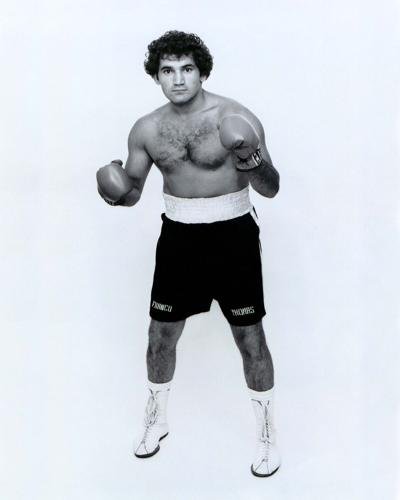TOMMY THOMAS : A LEGEND REMEMBERED
/LEGACY
A LEGEND REMEMBERED
By: Joel E. Gordon
'He was ahead of the times': Legendary West Virginia boxer Tommy Thomas remembered as advocate of “community policing” before it even had a name.
CLARKSBURG, W.Va. population 16,578 has lost a legend. Tommy Thomas, who rose to be the No. 6 heavyweight fighter in the world during his boxing days before becoming a much-beloved police officer, has passed away.
Sports fans, especially in West Virginia, will remember Thomas as the local legend who battled some of the sport’s biggest names during his professional career from 1977-86. Thomas fought 42 professional bouts, finishing with a record of 34-8, with 21 knockouts. His career also featured 56 amateur bouts, where he posted a 46-10 record and was a national semifinalist for heavyweight Golden Glove honors.
He famously fought in Alaska for a time and two potential opponents looked at him and declared that he didn’t look that tough. It was decided he would face both opponents in separate matches on the same card. He defeated both in the third round of their respective fights.
While Thomas earned legendary status in West Virginia with his boxing, those in Clarksburg grew to know the man he was through his work in law enforcement.
Thomas had a natural ability to communicate with people of all ages, but especially children. He served as the Drug Abuse Resistance Education (DARE) officer for Clarksburg police, going into schools to help educate children on the dangers of drugs. Thomas served in the position for about 17 years, as well as working as a regular duty officer, until his retirement.
Harrison County Sheriff Robert Matheny said Thomas was a unique individual whose love of boxing was only matched by the love of his community and police work. “He was ahead of the times,” Matheny said. “He knew ‘community policing’ before there was a name for it.
“The way he acted and treated people is the way they teach police officers today,” Matheny said. “Now that we look back on it, those of us who worked with him know what he was doing.”
“Once he got involved with the DARE program, he lived it and loved it,” Matheny said. “Thousands of kids remember the lessons he taught them and are better for it.
“I just came across the other day a national magazine from years ago that had a feature on him and what he was doing (with DARE).
“He loved to teach other officers what he was doing and shared the (DARE resources) with us to pass out to kids we’d encounter. He was a great man, a great friend. A great officer.”
Current Clarksburg Police Chief Mark Kiddy also worked with Thomas before going on to a distinguished career with the West Virginia State Police.
“It’s a huge loss for the community,” Kiddy said. “He was so well known and loved. He was community-oriented, just loved people and loved kids and being around them.
“He was always there to help people,” Kiddy said. “I’ve seen him give his watch to a guy who didn’t have one. I’ve seen him buy food for people that were hungry and helped them any way he could.
“He was very selfless,” Kiddy said. “There aren’t enough words to say all the good things about him. He was just a great guy.
“He never met a stranger,” Kiddy said. “He’d drive through town and would be waving at everyone. He just knew how to treat people, to make them feel special.”
Thomas earned high recognition from the community he loved, being named an Exponent Telegram Citizen of the Year in 2001.
In 1999 he was named Citizen of the Month by the Shinnston News and Harrison County Journal. In 2007, he received the Frank Loria Lifetime Dedication Award by the Clarksburg Columbian Club; Elks Citizen of the Year for the Central District 2008-2009; in 2010 he was named Honorary Irish Legend by the Harrison County Catholic Schools; and he was presented with the FBI Director’s Community Leadership Award, also in 2010.
Thomas’s legacy lives on through the Tommy Thomas Boxing Club at the Clarksburg Recreation Center, which remains open to males and females age 12 and older who want to learn the sport of boxing.











































































